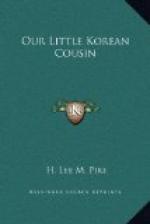“Such a deliverer appeared in the person of Taijo. It is said that even as a boy he surpassed his fellows in goodness, intelligence, and skill in all sorts of boyish games.”
Wang Ken improved this opportunity to tell Yung Pak how important it was that all boys should follow such an example.
But while Yung Pak listened with apparent patience, he could hardly conceal his inward desire that the tutor would go on with his story. Like most boys, of all races, he felt that he could get along without the moralizing.
“Hunting with the falcon was one of Taijo’s favourite sports. One day, while in the woods, his bird flew so far ahead that its young master lost sight of it. Hurrying on to find it, Taijo discovered a hut beside the path, into which he saw the falcon fly.
“Entering the hut, the youth found a white-bearded hermit priest, who lived here alone and unknown to the outside world. For a moment Taijo was speechless with surprise in the presence of the wise old hermit.
“Seeing his embarrassment, the old man spoke to him in these words:
“’What benefit is it for a youth of your abilities to be seeking a stray falcon? A throne is a richer prize. Betake yourself at once to the capital.’
“Now Taijo knew how to take a hint as well as any boy, so he immediately left the hut of the hermit, forsaking his falcon, and went to Sunto, then the capital of the kingdom.
“As I have already told you, Taijo was a wise youth. He did not rush headlong into the accomplishment of the purpose hinted at by the hermit. Had he done so, and at that time attempted to dethrone the king, he would certainly have been overpowered and slain.
“He took a more deliberate and sensible way. First he enlisted in the army of the king. As he was a young man of courage and strength, he was not long in securing advancement. He rapidly rose through the various grades, until he finally held the chief command of the army as lieutenant-general.
“Of course Taijo did not reach this high station in a month, nor in a year, but many years went by before he attained such an exalted place. Meanwhile he married and had children. Several of these children were daughters.”
Wang Ken did not say right here, what he might have said with truth,—that in Korean families girls are considered of very little consequence. But in this case Taijo’s daughter proved to be of much help in making her father the king of Cho-sen.
“One of these daughters was married to the reigning king. Thus Taijo became father-in-law to his sovereign. You can easily see that in this relationship he must have had a large influence both over the king and over the people.
“Being a brave man and courageous fighter, Taijo was idolized by his soldiers. He was also very popular with all the people because he was always strictly honest and just in all his dealings with them.




